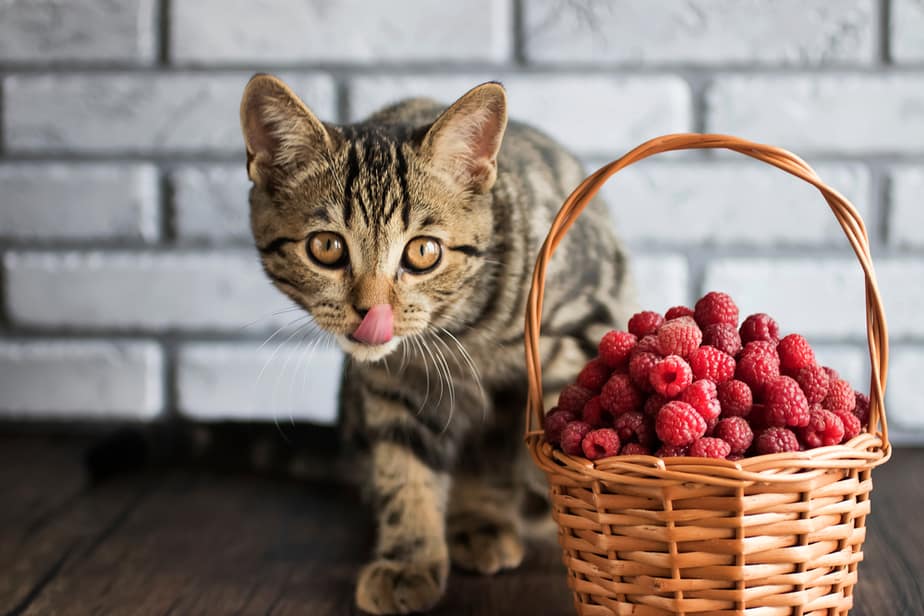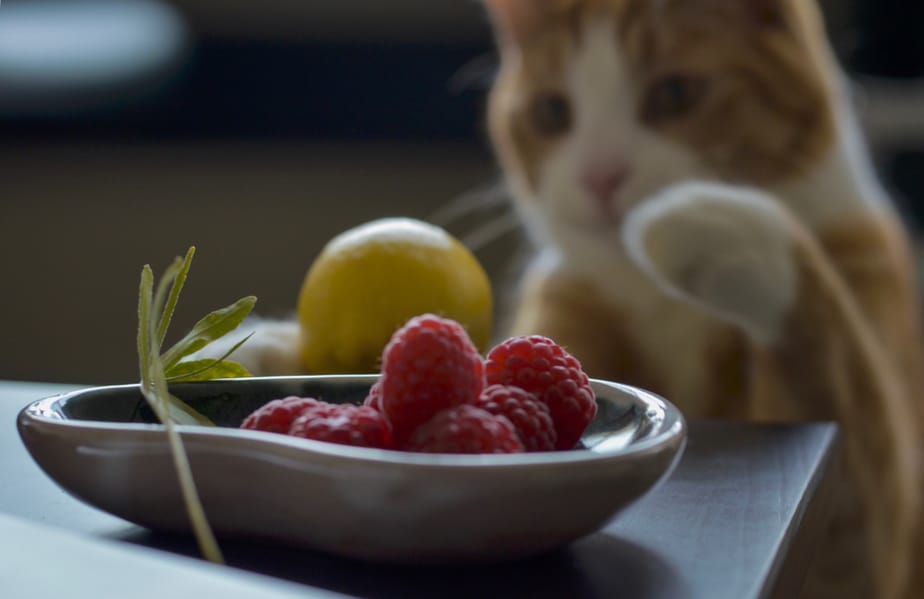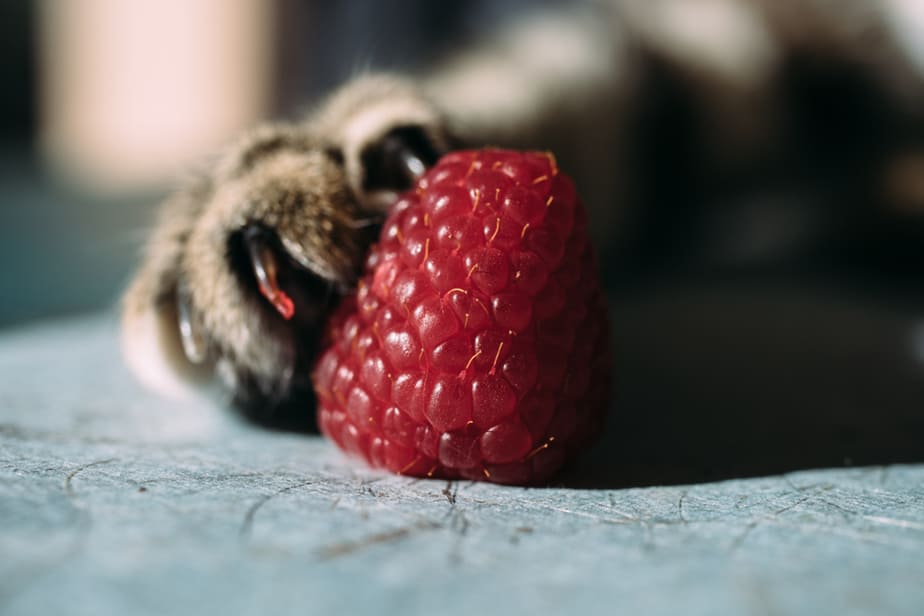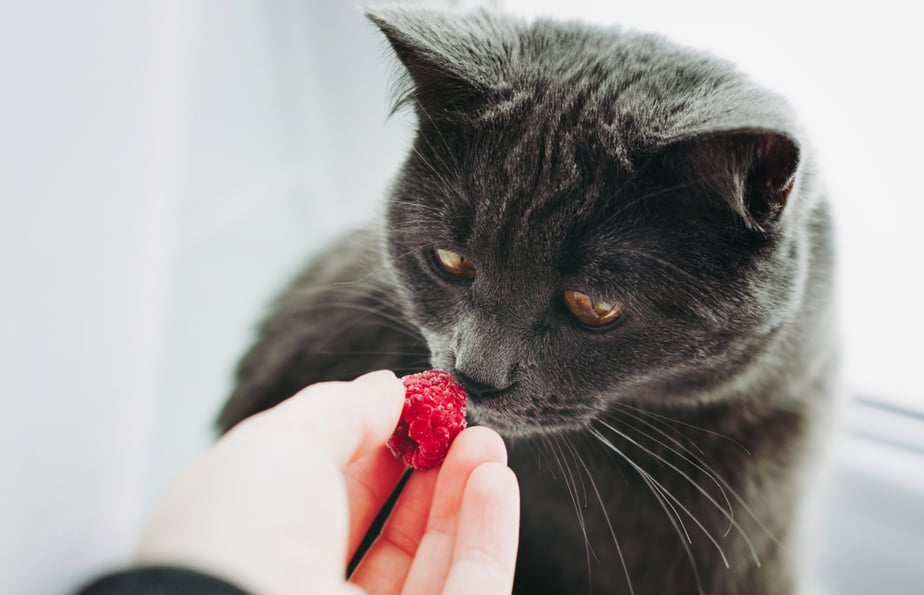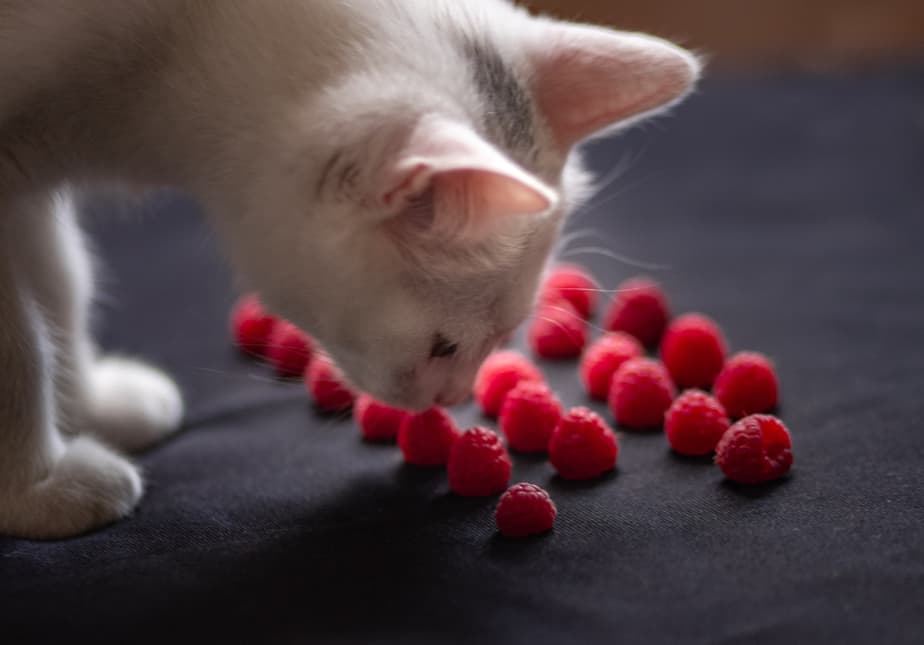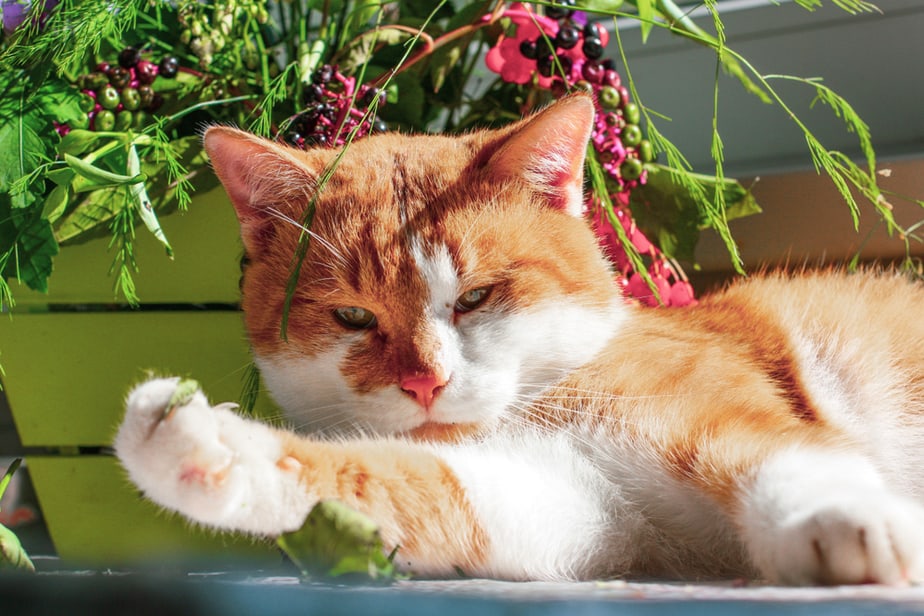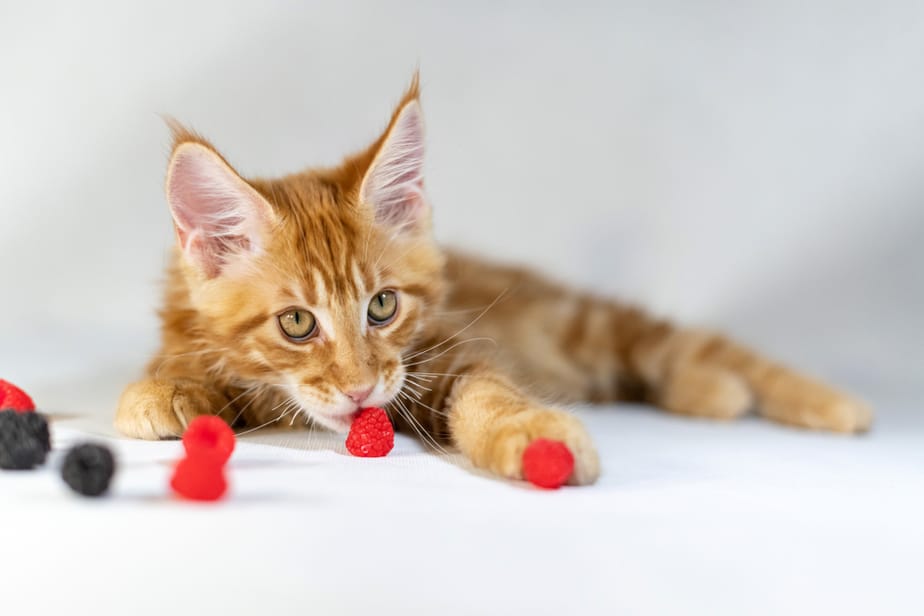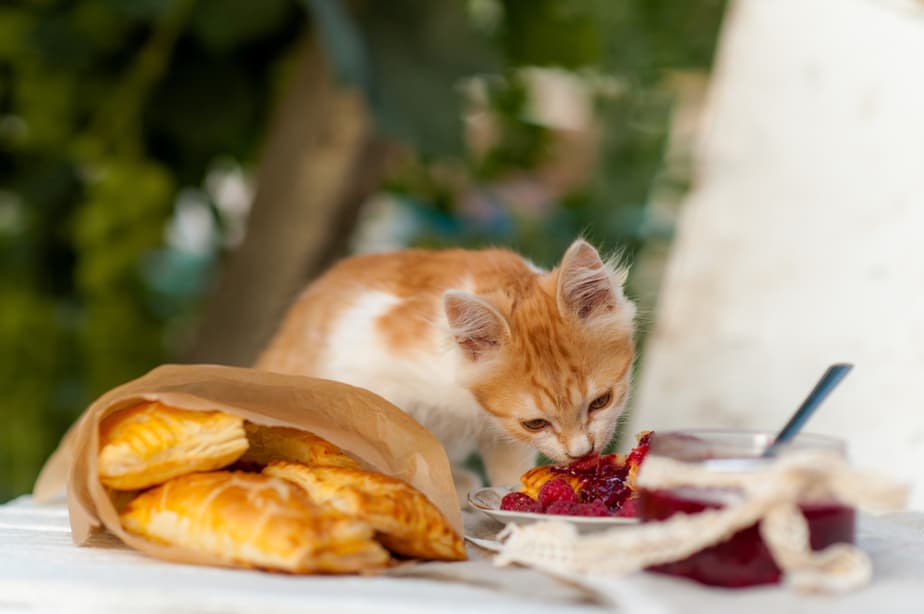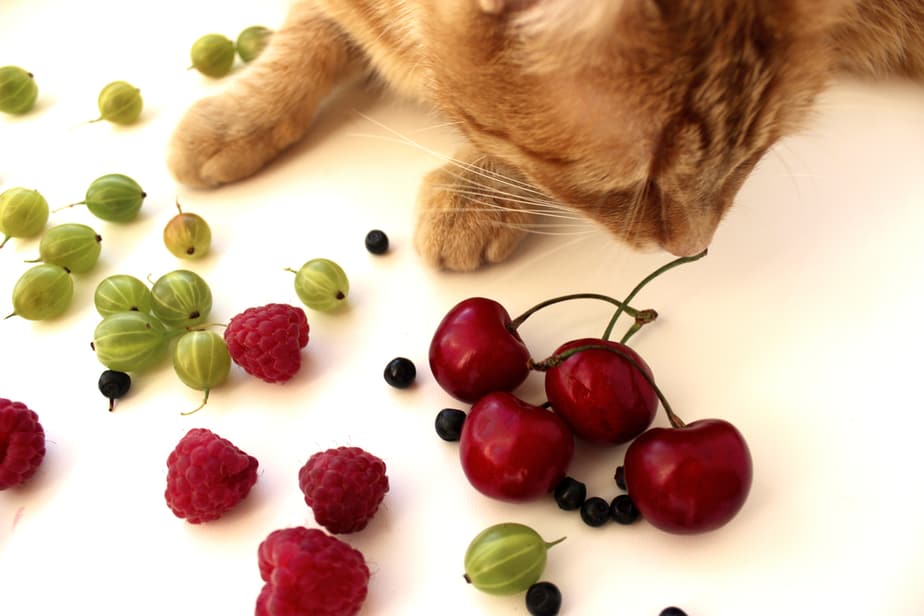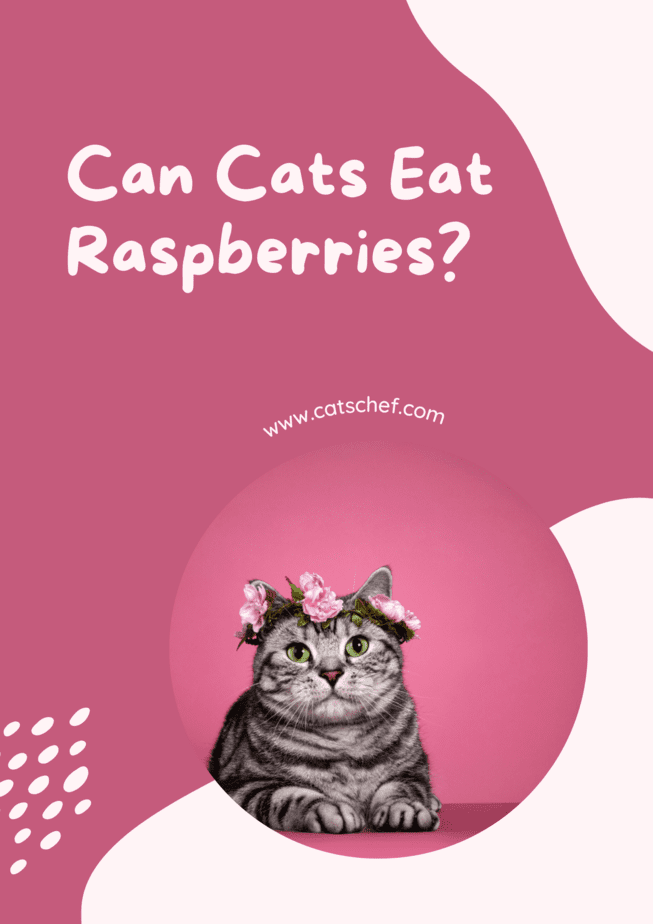📖 Table of Content:
I know this may sound like a weird question but can cats eat raspberries? It’s not very common for felines to be interested in anything other than meat or fish, for example.
If you’ve spoiled your pet, it gets even harder getting her to try out some new foods. But then you remember that you have a naughty kitty that’s been rummaging through your stuff.
It isn’t so hard for my cat to go through my shopping bag because I always forget to put it away. I deceive myself by thinking she’s a polite furkid and won’t cause any trouble.
Yet, I’m mistaken every time I come back into the kitchen and see the mess. She will paw out anything she deems interesting enough, and leave all the chaos for me to clean up!
However, I’m not worried about cleaning the stuff as I’m more worried about what has she gotten into. I can live with her eating my lunch for the day as long as it won’t harm her.
My memory doesn’t serve me well and in that panic mode, I can’t really remember what I’m ought to do. I’ll know once she comes out of her hiding and I see the pawprints leading from the crime scene!
Can cats eat raspberries safely?
If your furbaby gets herself and you in a lot of trouble like mine does, there are some questions that need to be answered. And one of these appears to be: Can cats eat raspberries?
As we all know, our felines aren’t really intrigued by fruits. However, they can spark their interest from time to time. Especially these small, cute-looking berries.
Cats are curious creatures, so she’ll probably try to taste it. It doesn’t necessarily have to mean that she’ll eat it though. Just a quick bite or a lick to see what it is.
Felines experience life and the outside world through their senses. One of their strongest senses is smell, so you’ll notice her sticking her nose in your bowl a lot of time.
Still, if something is perfectly safe for humans, does it have to mean it’s okay for cats to consume? No, and we all have to be aware of this fact for the sake of our pets’ health.
However, the good news is that cats can eat raspberries in small amounts. They’re not toxic to felines, so it’s safe to say that her hunting around your grocery bag isn’t dangerous for now.
Do cats like these tiny fruits?
Every cat is an individual, so it would be tough to judge. We know for a fact that felines aren’t plant-lovers, but there may be some oddballs out there!
If you have a curious, fluffy baby as I do, then I’m sure she’ll at least give it a quick nibble. She may not be interested at first, so don’t try to force her.
If she gets curious about it, give her only a couple of bites. That way she can get acquainted with these small berries and it will save you a lot of mess if she decides they’re sworn enemies.
Don’t ask me how I know. Once she’s tried it, she’ll either run away or beg for some more. However, don’t get ahead of yourself and make sure these are only occasional snacks.
You can always consult with your regular vet about incorporating these small bites into her diet.
Are there any health benefits?
As every cat parent, we want to know what we’re feeding our furbabies. Sometimes I’ll eat a big portion of junk food like french fries and won’t give it a second thought.
On the contrary, when it comes to the health and well-being of my pet, I turn on my research mode. I check for any health benefits and also health hazards. Looks can be deceiving, so a lot of food that looks harmless can end up dangerous for pets. Anyhow, raspberries are a good source of nutrients for cats, but let’s see what kind.
Still, this doesn’t mean they should be her primary choice of food. Remember that cats are carnivores, so they’re not so keen on feasting on plants.
1. Vitamins and minerals say that cats can eat raspberries!
If you didn’t know this already, these tiny fruits are a chock-full of vitamins and minerals. These are essential for your cat’s health and you too.
Humans can’t go a day without these nutrients, so what makes your cat any different? It’s true that our bodies are built differently, but felines need these health supplements just as much as we do.
What you’ll find in these colorful berries will surprise you, in a good way! They’re loaded with vitamin A, for instance. A few of these on an occasion could help with your pet’s vision.
This nutrient is known to help prevent vision impairment and help with eyesight. Also, it’s not the only vitamin found in these superfruits.
Vitamin C is abundant in raspberries but isn’t as essential because felines synthesize it in their liver. However, an extra amount can only help your pet with various bodily functions.
It helps repair the damaged tissues, which makes the process of wound healing a lot quicker. Moreover, it’s involved in the formation of collagen and the absorption of iron that’s essential for the red blood cells.
Speaking of red blood cells, another nutrient that helps in their development is B vitamins. They are also found in these fruits and are another reason why cats can eat raspberries.
As for the minerals, manganese and potassium play a key role in your cat’s organism. In this combination, the minerals help improve bone strength.
Furthermore, potassium balances the sodium levels and keeps the heart rhythm steady. Manganese also has an important role in regulating the sugar levels in the blood.
Many more health supplements can be found in raspberries, which is why they can be healthy for both you and your furry friend.
2. A source of antioxidants!
Vitamins and minerals aren’t the only things that have been attributed to these fruits. Raspberries are also a great source of antioxidants.
These nutrients contain anti-inflammatory and antibacterial properties that help reduce inflammations. They are especially helpful if your cat’s suffering from certain joint inflammations such as arthritis.
Just like blackberries, these won’t cure your pet, but they can help her feel better and ease the pain. Antioxidants may prevent or lessen the damage that’s been made by oxidants in the body.
This is a way to reduce the risks of many different diseases.
3. Can cats eat raspberries because of dietary fiber?
For sure they can! Dietary fiber found in raspberries is responsible for your cat’s intestinal health. It’s good for digestion as it helps create bulk in the stool.
This nutrient fights off constipation so if your pet is feeling a bit bloated, add some more fiber foods to her diet. However, make sure to consult your vet if the problem doesn’t go away.
Still, make sure you don’t overdo it at the same time. Fiber can create an adverse effect on your feline’s health. While it’s known to lower cholesterol levels, it can also cause diarrhea.
We all know how unpleasant this whole ordeal can be, so we rather wish to skip the scenario.
4. Protein and omega-3 fatty acids!
You may be surprised, but believe it or not, it’s true. Raspberries contain traces of protein and omega-3 fatty acids. Although these nutrients aren’t found in high percentages in raspberries, they still come in handy. These two health supplements are essential for your cat’s growth and development.
For instance, protein is the number one health benefit for felines. They simply can’t lie without it and need to consume it daily. Even though she’ll be satisfied with the amount of it found in meat, raspberries can be a great snack.
Protein is crucial for carnivores because it provides them with an energy source. Without this important nutrient, your pet would likely become sick very quickly.
As for the omega-3 fatty acids, you probably know that they’re abundant in fish such as sardines. Thankfully, raspberries aren’t an exception. Sure the amount can’t be the same as in other animal-based foods, but it’s completely worth it. These are healthy fats that have numerous health benefits for felines.
It feeds their coat and makes sure it’s shiny and fluffy. Maybe she’s born with it, or maybe it’s the omega-3 fatty acids, who knows!
Just like protein, they’re an amazing source of energy and the reason she keeps you awake at night, too! They add to your cat’s overall health, give her extra energy, and ensure a shiny coat.
Are there any health concerns?
Well, as you may have guessed – every good comes with the bad and vice versa. You don’t have to stress for now, but keep an eye out for these fruits.
People tend to think that certain foods are fine for cats to indulge in all the time. However, this isn’t always the case. Even though raspberries hold particular health benefits, it doesn’t mean you should incorporate them into her diet in large quantities.
Cats are carnivores
This is probably clear to you by now, but just a reminder that your feline is an actual carnivore. In fact, she’s an obligate carnivore.
What does this mean? Your pet needs meat on a daily basis in order to survive. If you’re opting to go vegan, you might as well leave your furry friend out of the plan.
Meat is made to sustain felines and all of their dietary needs. It contains every possible nutrient that she needs. Although a few berries here and there can be good for her health, don’t overdo it.
The health supplements found in raspberries are useful, but they aren’t crucial. The difference is that the nutrients from plant-based foods such as edamame are beneficial, but not as much as the meat-derived ones.
This is due to the fact that a carnivore’s system isn’t designed to break down plant matter. Therefore, it’s possible she’ll have some difficulties digesting fruits and veggies.
What’s sad is that the nutrients go to waste because her body simply isn’t fit for utilizing all the health supplements they offer.
Can cats eat raspberries? Yes, but…
I know, I also get tired of these “buts” at times. But, oh well. Cat parents gotta do what they gotta do, right? And this implies taking all of the precautionary measures when it comes to your pet.
One of the health concerns that come with cats eating raspberries and other fruits like tangerines is sugar. We all love the sweet flavor of the colorful fruits, but it’s because of the sugar.
You’re probably wondering “it’s natural, so why is it concerning?” Well, cats aren’t made for digesting sugar. It’s a carbohydrate that isn’t welcomed in their organism.
She had fruits before and nothing bad happened, so what’s the deal? You’re right, but did she eat a full bowl or just a few bites?
Here’s the thing: felines are unable to digest sugar properly which can lead to its build-up. It’s not poisonous, so don’t worry. However, it can be detrimental to her health if she feasts on it regularly. As time passes by, these carbs can turn into fat. We’ve all been there, but what about our pets?
Felines are agile creatures so this would probably be a problem for your pet. Excess weight isn’t a big deal until other related health issues start surfacing.
Moreover, too much sugar and carbs over time can lead to the development of diabetes. This disease seriously impacts the quality of your pet’s life.
Also, one of the concerns comes in the form of bone health. Excessive sugar intake can damage your feline’s teeth and cause tooth decay.
The good news is that felines are unable to taste sugar because they lack the taste buds for picking up the flavor. However, refrain from feeding her any sweet treats such as waffles.
Raspberries may cause gastrointestinal upset
Even with all the health advantages this fruit carries, it also has a downside to it. Due to them being plants, cats can have a hard time digesting them.
It’s unusual for your pet to have an upset stomach from a few of these snacks. However, if she feasts on them, it’s possible she’s going to experience some stomach pain.
All the dietary fiber can cause diarrhea and perhaps abdominal pain.
Can cats eat frozen raspberries?
This is an interesting one. Why couldn’t they? No reason! So, if you’re wondering if cats can eat frozen raspberries, go for it! These can be delicious, small treats on hot summer days, and they will offer your pet that extra hydration.
We know how cats are when it comes to water, in any form. So, instead of buying those expensive water fountains, just freeze up some healthy snacks.
This is way better than feeding your cat popsicles for instance. Although you don’t avoid the sugar levels when giving your cat frozen treats, she’ll be fine with a few bites.
However, don’t overdo it. As we previously mentioned, this isn’t a feline’s natural choice of food.
Can cats eat raspberry jam?
People spend most of their time by their pet’s side. They share their living space and food with them. This is a tricky part because cats are known to be beggars.
They’re more subtle than dogs, for instance, but can still be a pain in the neck. My pet will make me feel sorry for not sharing some of my snacks with her and she’s really good at it. Those big, doe eyes are all it takes for me to melt right away.
However, I know that sometimes, sharing isn’t caring. Felines don’t require sweets in their diet, so it’s best to stay away from them.
Raspberry jam has little to no nutrients for felines, so she would do best if she keeps her paws off of it. But you’re thinking to yourself how can cats eat raspberries but not raspberry jam?
Well, the answer is pretty much simple – it’s sugar. As I’ve mentioned above, sugar is harmful to felines in the long run. However, that was the fruit’s sugar I was talking about.
When speaking of jam and other sweets like jelly, your cat should be careful around those. They usually contain xylitol, which is a compound used for giving the sweet flavor.
Unfortunately, this chemical keeps your pet from eating raspberry jam because it’s highly poisonous to felines. This artificial sweetener is screaming “DANGER” to your cat.
Can cats eat raspberry yogurt?
Yogurt is fine for felines in small amounts. If it contains lactose, make sure you don’t give her too much of this treat. Cats are lactose intolerant, so it’s possible she’ll have the runs afterward. Raspberry yogurt is okay for furkid to eat but mind the sugar levels.
Also, it can contain high amounts of fat which aren’t good for her health. All in all, keep her intake under close supervision and view this as an occasional treat rather than a proper meal.
To conclude
If you’ve been asking yourself: can cats eat raspberries, I hope this question doesn’t stress you out anymore. All in all, these tiny fruits are an amazing source of nutrients, such as vitamins, minerals, protein, and others.
They’re beneficial for your cat’s health and serve as a healthy snack from time to time. What you should keep in mind all the time is that every pet is different, so if she doesn’t fancy this colorful berry, it’s fine.
Maybe she has an eye out for some mango rather than small fruits. Either way, try to keep her diet balanced and fit for a carnivore’s system.
Even with all the pros, this fruit contains some health concerns such as sugar. It’s off-limits for cats, but eating fruits like raspberries and cherries every so often isn’t going to harm them.
As for the raspberry jam and other sweets, it’s a shame you can’t share it with your pet. However, remember it’s for her own good.
The good news is cats can eat raspberries after all, and that’s all that matters!

